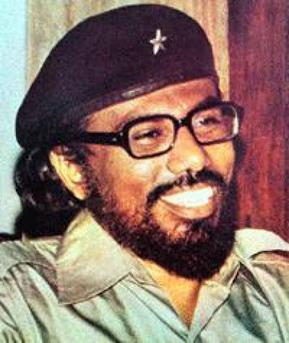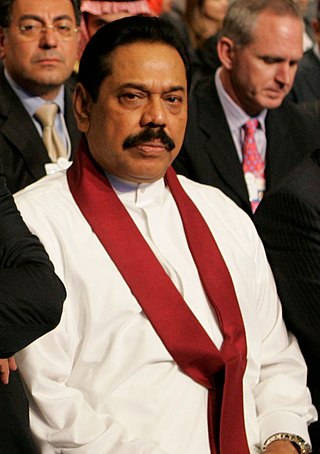
Parliamentary elections were held in Sri Lanka on 2 April 2004. The ruling United National Party of Prime Minister Ranil Wickremesinghe was defeated, winning only eighty two seats in the 225-member Sri Lankan parliament. The opposition United People's Freedom Alliance won 105 seats. While this was eight seats short of an absolute majority, the Alliance was able to form a government.

Parliamentary elections were held in Sri Lanka on 5 December 2001, just a little over a year after the previous elections in October 2000.

The Communist Party of Sri Lanka is a communist party in Sri Lanka. In the 2004 legislative election, the party was part of the United People's Freedom Alliance that won 45.6% of the popular vote and 105 out of 225 seats.

Janatha Vimukthi Peramuna is a Marxist–Leninist communist party in Sri Lanka. The party was formerly a revolutionary movement and was involved in two armed uprisings against the government of Sri Lanka: once in 1971 (SLFP), and another in 1987–89 (UNP). The motive for both uprisings was to establish a socialist state.

The Lanka Sama Samaja Party, often abbreviated as LSSP, is a major Trotskyist political party in Sri Lanka. It was the first political party in Sri Lanka, having been founded in 1935 by Leslie Goonewardene, N.M. Perera, Colvin R. de Silva, Philip Gunawardena and Robert Gunawardena. It currently is a member of the main ruling coalition in the government of Sri Lanka and is headed by Tissa Vitharana. The party was founded with Leninist ideals, and is classified as a party with socialist aims.

Patabendi Don Jinadasa Nandasiri Wijeweera, better known as Rohana Wijeweera, was a Sri Lankan Marxist political activist, revolutionary and the founder of the Janatha Vimukthi Peramuna. Wijeweera led the party in two unsuccessful insurrections in Sri Lanka, in 1971 and 1987 to 1989.
The United People's Freedom Alliance was a political alliance in Sri Lanka founded by former Sri Lankan president Chandrika Kumaratunga in 2004 and dissolved by former Sri Lankan President Maithripala Sirisena in 2019.

The 1987–1989 JVP insurrection, also known as the 1988–1989 revolt or the JVP troubles, was an armed revolt in Sri Lanka, led by the Marxist–Leninist Janatha Vimukthi Peramuna, against the Government of Sri Lanka. The insurrection, like the previous one in 1971, was unsuccessful. The main phase of the insurrection was a low-intensity conflict that lasted from April 1987 to December 1989. The insurgents led by the JVP resorted to subversion, assassinations, raids, and attacks on military and civilian targets while the Sri Lankan government reacted through counter-insurgency operations to suppress the revolt.
Nagalingam Shanmugathasan was a trade unionist and Maoist revolutionary leader in Sri Lanka. He was the General Secretary of the Ceylon Communist Party (Maoist)

Colvin Reginald de Silva was a Sri Lankan Cabinet Minister of Plantation Industries and Constitutional Affairs, prominent member of parliament, Trotskyist leader and lawyer in Sri Lanka. He was one of the founders of the Lanka Sama Samaja Party – the first Marxist party in Sri Lanka.
During the Donoughmore period of political experimentation (1931–48), several Sri Lanka leftist parties were formed in British colonial Ceylon. Unlike most other Sri Lankan parties, these leftist parties were noncommunal in membership.
The Jathika Nidahas Peramuna (JNP) or National Freedom Front (NFF) is a political party in Sri Lanka which was formed by ten JVP parliamentarians led by Wimal Weerawansa, as a breakaway group of the Janatha Vimukthi Peramuna (JVP).
Don Edwin Weerasinghe Gunasekera is a Sri Lankan politician, former Member of Parliament and former cabinet minister. He is the current leader of the Communist Party of Sri Lanka (CPSL), a member of the United People's Freedom Alliance (UPFA).
Upali Tissa Vitharana is a Sri Lankan politician, former Member of Parliament and former cabinet minister. He is the current leader of the Lanka Sama Samaja Party (LSSP), a member of the United People's Freedom Alliance (UPFA), and is serving as Governor of North Central Province.

Parliamentary elections were held in Sri Lanka on 8 and 20 April 2010, to elect 225 members to Sri Lanka's 14th Parliament. 14,088,500 Sri Lankans were eligible to vote in the election at 11,102 polling stations. It was the first general election to be held in Sri Lanka following the conclusion of the civil war which lasted 26 years.

Vikramabahu Karunaratne is a Sri Lankan politician. He was a candidate in the 2010 presidential election.

Vasudeva Nanayakkara is a Sri Lankan left-wing politician, Member of Parliament and presidential candidate in the 1982 and 1999 Sri Lankan presidential elections.

Leslie Simon Goonewardene was a prominent Sri Lankan statesman. He founded Sri Lanka's first political party, the Lanka Sama Samaja Party, in 1935, and served as its General-Secretary from 1935 to 1977. Goonewardene was a key figure in both the Indian independence movement and the Sri Lankan independence movement. He was designated as a National Hero of Sri Lanka for his leadership in the independence movement, and his efforts are celebrated each year on the Sri Lankan Independence Day.
Terrorism in Sri Lanka has been a highly destructive phenomenon during the periods of the Sri Lankan Civil War (1983–2009) and the first and second JVP insurrections. A common definition of terrorism is the systematic use or threatened use of violence to intimidate a population or government for political, religious, or ideological goals. Sri Lanka is a country that has experienced some of the worst known acts of modern terrorism, such as suicide bombings, massacres of civilians and assassination of political and social leaders, that posed a significant threat to the society, economy and development of the country. The Prevention of Terrorism Act of 1978 is the legislation, that provides the powers to law enforcement officers to deal with issues related to terrorism in Sri Lanka. It was first enacted as a temporary law in 1979 under the presidency of J. R. Jayewardene, and later made permanent in 1982.
In March 1971, various leftist groups in the Dominion of Ceylon protested against U.S. involvement in the Vietnam War.












